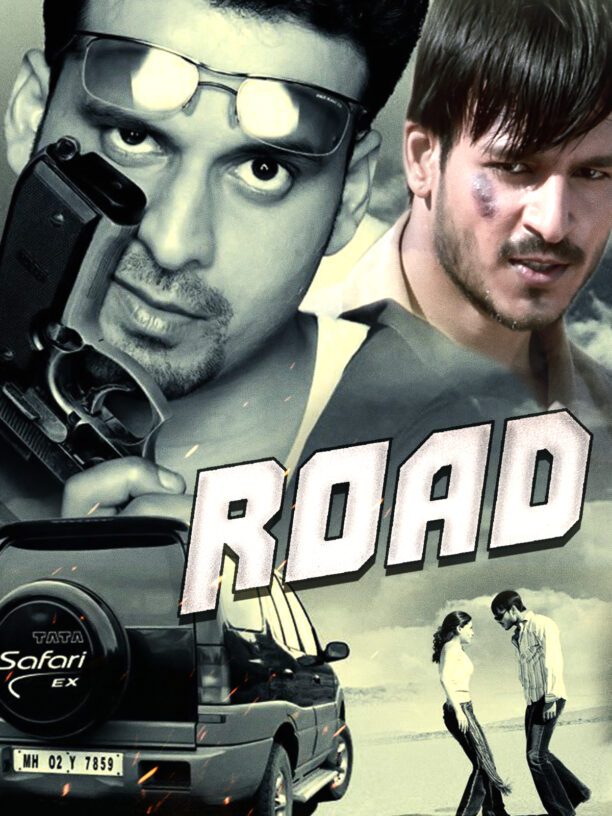 Subhash K Jha takes a look back at 2002’s Road produced by Ram Gopal Varma and directed by Rajat Mukherjee, starring Manoj Bajpayee, Vivek Oberoi and Antara Mali.
Subhash K Jha takes a look back at 2002’s Road produced by Ram Gopal Varma and directed by Rajat Mukherjee, starring Manoj Bajpayee, Vivek Oberoi and Antara Mali.
In a Ram Gopal Varma production, the only predictable factor is the unpredictablity. Like the barren sand-swept highway on which this film’s love birds Vivek Oberoi and Antara Mali take off for a runaway marriage, we never know what lies ahead on the road. Director Rajat Mukherjee takes viewers for a ride that we aren’t likely to forget in a hurry. He sweeps us into the vortex of a disturbingly implosive violence on a lonely and stark highway in Rajasthan where anything can happen. The screaming, blazing sunshine invites trouble. And we’re sucked into kind of innocuous nightmare where the battle lines are drawn to accommodate various sub-cultures of pop entertainment including music videos and Hollywood’s bubblegum-horror flicks.
As the defiant lovers Laxmi (Antara Mali) and Arvind (Vivek Oberoi) zip off to the accompaniment of screaming wheels and wailing guitars (Sandesh Shandilya’s aggressive music score needed to be tempered severely since it often gets in the way of the dialogues ) we kind of sit up in anticipation. This is a film that takes you along.
The what-next feeling never leaves us as we watch the lead pair’s life on the road being overtaken by a very normal-seeming stranger Babu (Manoj Bajpai) who thumbs a ride from Arvind and Laxmi and then traumatizes them through a maze of unbelieveably exacerbated adventures.
The film uses the barren landscape to great advantage. There’s no assuaging greenery just the virile rust and brown frames housing a hefty disturbance in the cosmic order. First-time cinematographer Sudeep Chatterjee shoots the hinterland with stark grace. The bleak beauty of the frames echo the incendiary tensions of the Spaghetti Westerns of Sergio Leone.
The three characters trapped in a lethal game of catch-me-if-you-can blend into the scenario with seeming effortlessness. In most Hindi mainstream films, the principal players stand a little apart from the landscape in a glamorous enclave. For the first time the actors seem to fully belong to the world that they inhabit.
It’s a bleak and barren world punctuated by unexpected spurts of humour. There’re interestingly devised cameos featuring several Varma groupies. Theatre actor Makarand Deshpande (who did the narration in Varma’s Company) is a mass of bewildered synergy playing a truckdriver fascinated by Sunny Deol in Gadar. Through such characters Varma’s cinema constantly draws attention to and deflects from formulistic conventions.
The most interesting incidental character is Rajpal Yadav as a film–fixated petrol pump attendant whom Manoj Bajpai convinces he’s the Devdas director Sanjay Leela Bhansali. After the psychopath roughs him up the Yadav character vows never to watch Bhansali’s films again.
The theme of ‘The Intruder’ recurs in Ram Gopal Varma’s cinema. In Kaun and Pyar Tune Kya Kiya the characters played by Manoj Bajpayee and Urmila Matondkar threatened to disrupt the tranquility of the household. In Road, Varma’s cinema steps out in style.
The film’s deceptively casual mode of operation adds to its implosive tension. The narration offers a queer mix of the natural and the aggravated. Everything and everyone appears at one with the plot and yet at odds with the rules of civilized behaviour.
Bajpayee as the intruder Babu is more controlled and in-charge of his character’s karma than ever before. Very little is told to us about the character’s antecedents except when he begins to open up before his captive. When Babu begins to confide in Laxmi she exudes a certain raw energy that goes against every rule of coy conduct observed by the Hindi film heroine.
Contradictorily Mali is made to get between skimpy linen and slither and slide in rites of sensuality for an remarkably superfluous song. This unwonted road thriller could have avoided the embarrassing contradictions of Hindi cinema, like the bizarre songs and dances. Though done in a rolickingly renegade style , the numbers like model Koina Mitra’s sweaty and upfront ‘Nikal le bhaiyye’ arrest the fast moving narrative in its tracks and remind us that commercial Hindi cinema can never truly change its (beauty) spots.
The film’s most unforgivable aberration is Manoj Bajpayee’s dream sequence where the director lampoons Hindi cinema’s heaving bosoms-gyrating plevis routine. This sequence makes light of Bajpayee’s character immense psychological disturbances, diminishing the character’s failure to assimilate into mainstream society because of his conflicted selfworth.
In many ways Babu’s failure to “belong” is reiterated by the film’s spasmodic bursts of indignant formulism which cut rudely into its grainy gritty gound-level realism. Road captures the rhythms of screeching revved up wheels with a ruggedness and rawness never seen before in a Hindi film.
The almost total disregard for convention is mapped in the no-holds-barred aggression projected in Bajpayee’s and Mali’s performances. Vivek Oberoi, in a thanklessly ‘heroic’ role is far more subdued . Road gives him an opportunity to move away from his debut role in Company to portray a state-of-the-art leading man with intelligence subtlety and humour.
Oberoi’s romantic sequences with his co-star are agile and vibrant. Specially memorable is the sequence after Bajpayee’s first attempt to kidnap Mali where the couple in their car discuss the intruder with ironic humour. We may hate or love the romantic lead. But we’ve never seen their attitude to love, life and crisis before.
The same goes for the film. Road warns us to “Drive Carefully”. That’s advice Ram Gopal Varma has never listened to in his career. He has a particularly adventurous crew with him in this rollercoaster rise through Rajasthan. Though everyone is in his or her element Manoj Bajpayee walks away the acting honours. He’s sure to win all the villains’ awards.
But is he really the villain of the piece? That’s the disturbing thought with Road leaves us with.









